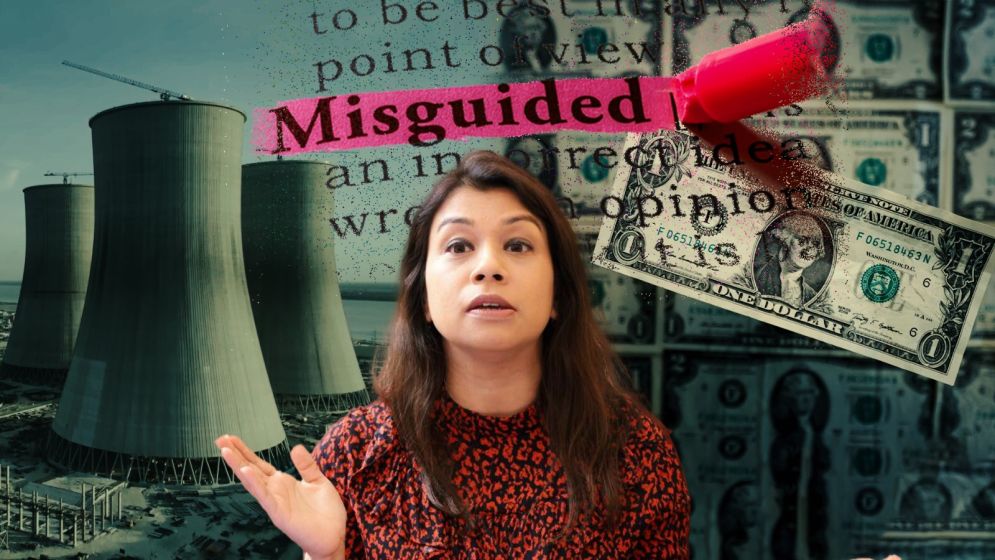How ‘disinformation’ fueled the fall of Tulip Siddiq

On August 17, 2024, the website globaldefencecorp.com published an article alleging that Tulip Siddiq MP, who was serving as Labour's City Minister at the time, orchestrated a $5 billion kickback from the Russian company Rostam to her aunt, Bangladeshi Prime Minister Sheikh Hasina.
The alleged kickback was linked to a $12 billion nuclear power plant agreement between Rostam and Bangladesh.
The article further claimed that Siddiq
played a key role in these negotiations during a 2013 family trip to Moscow.
“Tulip Siddiq facilitated the negotiation of kickbacks from Rostam to Sheikh
Hasina in London before finalising a deal to build a nuclear power plants in
Roopur in Bangladesh,” the article stated.
Despite the website’s polished appearance, the article exhibited many signs of disinformation—a frequent feature of the Bangladeshi political landscape.

Although it was accurate that Siddiq was
in Moscow at the time, the article presented no evidence to support its
allegations of corruption. It failed to cite a single source—named or
anonymous—or reference any documents to back up its claims.
The suggested scale of the kickbacks, supposedly amounting to nearly half the total value of the contract, also strained credibility.
Compounding the issue, when the article was first published, the featured image at the top—purportedly of Siddiq—was actually a photo of a completely different woman, likely generated by AI.
The accompanying caption, again offering
no evidence, claimed Siddiq “maintained strong business relationships with
Bangladeshi businesses to facilitate contracts through her aunt Sheikh Hasina
and received numerous kickbacks to maintain her lavish lifestyle.”
A closer look at the website also
suggested the site was not the specialist international aerospace and defence
site it presented itself as.
Almost the whole of the South Asia
section devoted to critical articles about Bangladesh’s Awami League, including
some with rather extraordinary titles including, “Bangladesh Air Guard (Thief): A Band of Morons”,
and another, “Bangladesh Military (thief): as inept as it is corrupt.”

Political
change in Bangladesh and UK
The article would likely have gone unnoticed were it not for the dramatic political shift that occurred in Bangladesh just over a week prior to its publication.
For 15 years, the Awami League had held power, with Siddiq’s aunt, Sheikh Hasina, serving as prime minister. Under her increasingly authoritarian rule, the local media refrained from publishing critical reports about the prime minister’s family—whether those reports were well-founded or, as in this case, entirely baseless.
However, on 5 August 2024, after Hasina’s law enforcement officers turned on student-led protests killing over one thousand unarmed protestors, the prime minister fled the country, resulting in the fall of the Awami League.
Then days after a new interim government was installed, and with newspapers excitedly using their newly won media freedom to investigate the corruption under the former government, globaldefencecorp published its article about Siddiq.
The Bangladeshi newspapers reproduced the claims with only the Dhaka Tribune raising questions about it.
The UK had also undergone political change, with the election of a Labour government a month earlier and Tulip Siddiq MP appointed as City Minister, tasked with overseeing anti-corruption efforts.
This context meant the globaldefencecorp article drew the attention of several British newspapers.
While some outlets attempted—unsuccessfully—to uncover evidence supporting the allegations, others chose to disregard the story altogether, perhaps recognising its lack of credibility or identifying it as disinformation.
-67a255ffcce4a-67fe4b045a013.jpeg)
Front
page news in UK
Yet, four months later, the article’s unverified allegations unexpectedly made front-page news across much of the UK media. How did this happen?
Shortly after the article’s release, Bobby Hajaj—an academic and leader of a small political party in Bangladesh—petitioned the country’s High Court to direct the national anti-corruption agency to investigate what he described as “credible information” regarding a $5 billion kickback, including the alleged involvement of Tulip Siddiq.
The legal filing, however, offered no new evidence beyond a repetition of the claims published by globaldefencecorp.
Then, on December 17, three months later, the anti-corruption agency announced it would open an inquiry, following a High Court order requesting the government to formally respond to the petition.
Even though there was no evidence to substantiate the allegations, beyond the assertions made in the article, for the British media the decision of the Anti-Corruption Commission changed everything, as now it felt it could write about the allegations through reporting on the launch of an official investigation.
Guido Fawkes published first, followed shortly by the Mail and then on the 19 December, all other national media, including the BBC.
A decision by another country to investigate the conduct of a British politician is of course newsworthy, but by reporting the Bangladesh ACC’s decision to investigate, the British media were given undeserved credibility to entirely unsubstantiated allegations without any consideration of their provenance.
Also absent from the British media’s coverage was any meaningful consideration of the highly politicised nature of Bangladesh’s judiciary and investigative institutions. In the country’s newly volatile political climate, with anyone favouring the Awami League coming under suspicion, only a brave and principled judge or anti-corruption official could realistically have refused a request to investigate alleged corruption involving a member of Sheikh Hasina’s family.
When the Awami League was in power, the country’s judiciary and Anti-Corruption Commission was effectively controlled by the governing party – and was used extensively against its political enemies.
But with Sheikh Hasina fleeing the country on 5 August, and following years of authoritarian rule with no free and fair elections, the newly established post-Hasina institutions very quickly swung 180 degrees and turned against the former governing party, with Sheikh Hasina and her family in the cross hairs.
Whilst, there is no doubt that many allegations concerning Awami League’s wide scale corruption are on much firmer evidential ground – with the country’s central bank estimating that as much as £17 billion has been siphoned from banks by pro-government businessmen taking it out spurious loans - Bangladesh’s anti-corruption agency’s decision to investigate the sensational allegations contained in globaldefencecorp article were not amongst those.

Siddiq
and the Awami League
In reporting the news of the Bangladesh investigation into Siddiq, the British media also suddenly woke up to Siddiq’s unusual relationship with Bangladesh’s Awami League.
Until that point, only a very small pocket of the British media had shown an interest in the UK politician’s connection to a foreign party, the most prominent being Channel Four News who had made a number of short films about how Siddiq had failed to raise the issue of disappeared men in Bangladesh whilst at the same time using the UK Awami League as a major part of her election campaigns.
The Mail on Sunday has also reported on how Siddiq in 2022 had moved into a property owned by a UK Awami League leader, which appeared to be specially purchased for her.
For several years, the Mail on Sunday had also been investigating the origins of a property Tulip Siddiq purchased in 2004 at the age of 23. Land Registry records indicated the purchase was made without a mortgage, prompting further scrutiny. However, the inquiry stalled after Siddiq explained that the property was bought using proceeds from the sale of a family asset, while declining to disclose which property had been sold.
Now, four months on, with the announcement of the Bangladesh investigation into the alleged $5billion kick back, British newspapers – particularly those on the political right – turned its guns on the politician and delved into how Siddiq became the owner of the 2004 flat along with other financial properties linked to her.
The Financial Times made the first significant breakthrough and found that the 2004 property was gifted to Siddiq by an Awami Leaguer connected land developer – indicating that Siddiq had earlier lied to the Mail on Sunday about the property.
The Sunday Times followed this up, finding that other properties that she lived in were also purchased by Awami League leaders.
Ultimately, the media identified five properties that either belonged to Siddiq or were occupied by her or her family members, which had either been gifted by or remained under the ownership of individuals linked to the Awami League.
On January 6, 2025, Siddiq referred herself to Sir Laurie Magnus, the independent adviser on ministerial standards, whose role was limited to assessing whether she had violated the Ministerial Code.
In his letter to the prime minister on 14 January, Magnus stated that he found “no suggestion of any unusual financial arrangements” – though the brevity of the correspondence left many questions unanswered. Following, its publication, Siddiq resigned to avoid being a “distraction” to the work of the labour government.
The role of globaldefencecorp
What role, then, did the “bogus” allegations in the globaldefencecorp disinformation article play in Tulip Siddiq’s resignation?
While her decision to step down was arguably justified by revelations concerning the origins of her UK property holdings and her broader connections to the Bangladesh Awami League, the impact of the globaldefencecorp article was undeniably significant.
It’s unlikely that the British media would have pursued Tulip Siddiq with such intensity had the Bangladeshi government not launched an inquiry into the corruption claims made in the article. Indeed, every subsequent report in the UK press about Siddiq was consistently framed by the Bangladeshi investigation into the alleged "$5 billion kickback.”
In addition, Siddiq’s decision to resign was likely informed by a realisation that British media would continue reporting every ebb and flow of the Bangladesh investigation into the disinformation article – something that they are in fact doing – making it unsustainable for her to continue.
Siddiq is now fighting back against many claims made by Bangladesh’s Anti-Corruption Commission and has written a letter stating that “the media has been used repeatedly as a vehicle to publish allegations against Ms Siddiq that have no truth.”
Although the letter is not directed at the UK media, one feels that it is as much a target of her letter as the ACC.
Wider disinformation
While globaldefencecorp.com stands out as a striking example of disinformation originating from groups hostile to the Awami League, it’s worth noting that since Sheikh Hasina’s fall from power, the majority of disinformation has flowed in the opposite direction.
The Awami League and its allies in India have flooded social media, and even the British parliament, with entirely false claims—ranging from allegations about the “Islamic” character of Bangladesh’s new interim government to accusations of a so-called “genocide” against Hindus.
More recently, the UK-based public relations firm Palatine Media was found distributing emails to Members of Parliament containing false information about the governor of Bangladesh’s central bank.
This entire episode poses serious questions for the British media. It underscores the need for greater caution and critical judgment when reporting on—and lending legitimacy to—dubious claims from disinformation sources, simply because they are being investigated by a foreign anti-corruption agency.
For Bangladesh, of course, the saga poses more serious issues for its anti-corruption agency which, under significant popular pressure to take action against the Awami League leadership and in particular members of the former ruling family, has allowed itself in some cases to be steered by factors other than evidence. Siddiq has many legitimate questions to answer, particularly in the UK, but accusing her of corruption in relation to cases where there is no supportive evidence will only weaken efforts to hold her to account in those that are well founded.
—
David Bergman is a journalist based in the UK and Bangladesh. He has long been covering Bangladesh affairs. He can be followed on X @TheDavidBergman

